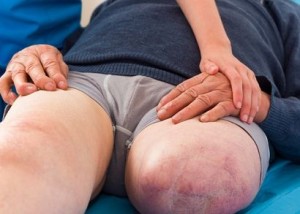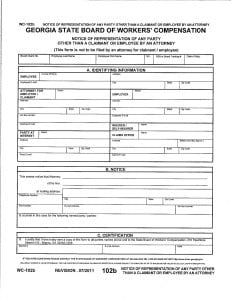If you suffer a serious workers compensation knee injury, your doctor may recommend knee surgery. Even after you have knee surgery, you may still have some permanent limitations as a result of your injury.
In Georgia and many other states, workers compensation pays you some benefits when you have a permanent impairment as a result of your injury. In this article, I will discuss what PPD ratings are and what PPD rating you should receive after knee surgery.
 What is a PPD rating?
What is a PPD rating?
PPD is an abbreviation for permanent partial disability. This rating is also sometimes known as a PPI or permanent partial impairment rating.
Under Georgia’s workers compensation law, PPD benefits are one of the three primary types of workers compensation benefits. The other two primary types of benefits are wage loss benefits (TTD or TPD) and medical benefits.
The PPD rating itself is a rating that your workers compensation treating doctor should give you. This rating will be to one or more body systems. The rating should be between 0 percent and 100 percent.
How is my PPD rating to my knee calculated?
Georgia law sets specific rules about how doctors must calculate permanent partial disability ratings in workers compensation cases. The law requires doctors to use a book published by the American Medical Association.
That book is the Guides to the Evaluation of Permanent Impairment. Georgia law requires doctors to use the fifth edition of that book.
This book attempts to rate any permanent partial disability that you could develop from an injury or disease. The book is divided into several chapters. Your doctor should use Chapter 17 which discusses “The Lower Extremities” to assign a permanent partial disability rating for your knee surgery.
When should I get a PPD rating?
As the name implies, permanent partial disability ratings focus on permanent disabilities or impairments. Because of this, your doctor will probably not evaluate you for a PPD rating until you reach maximum medical improvement (MMI).
<span data-mce-type=”bookmark” style=”display: inline-block; width: 0px; overflow: hidden; line-height: 0;” class=”mce_SELRES_start”></span>
What will my PPD rating be after knee surgery?
Your PPD rating after knee surgery depends on several factors including some of the following:
- The type of surgery;
- How successful the surgery is; and
- Your limitations after surgery.
Other factors can be important as well. Sometimes, you may have a low PPD rating if your surgery goes very well. But, some surgeries result in high PPD ratings even when the surgery is fairly successful.
Table 17-33 of the AMA Guides provides ratings for several different types of knee injuries. Some of the knee surgeries listed on this table are:
- Patellectomy (rating of 7% to the lower extremity for partial and 22% to the lower extremity for total)
- Menisctomy (the rating ranges from 2% to 22% to the lower extremity and depends on whether it is partial or total and whether it is medial or lateral or both)
- Total knee replacement (the rating depends on the quality of the result but ranges from 37% to 75% to the lower extremity)
 Will I always get a PPD rating if I have knee surgery?
Will I always get a PPD rating if I have knee surgery?
Not necessarily. Most knee surgeries do result in PPD ratings. However, some surgeries do not.
Even if your doctor thinks you have a zero percent PPD rating, they should still state that when you reach maximum medical improvement. Many doctor’s offices use work status forms that have a location on them for what your PPD rating is.
Can I challenge my PPD rating if I think it is too low?
Yes. The doctor’s rating is not final. If there is a disagreement about the correct PPD rating, you can request a hearing to have a judge make a determination.
Can I get a PPD rating for my knee even if I do not have surgery?
Yes. You do not have to have surgery to get a PPD rating. I represent many clients who receive PPD ratings even if they do not have surgery.











